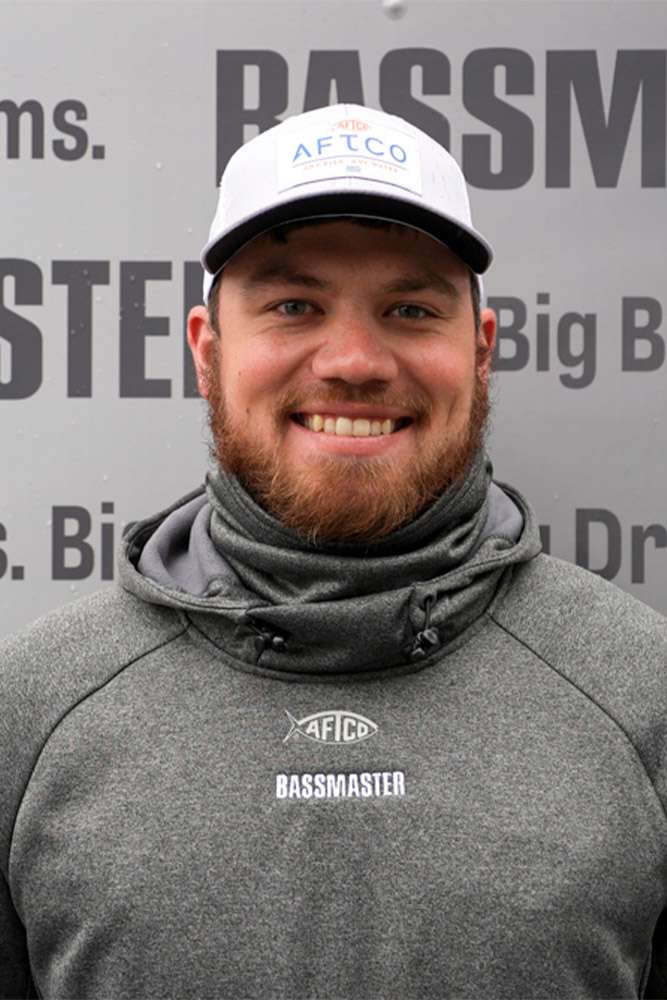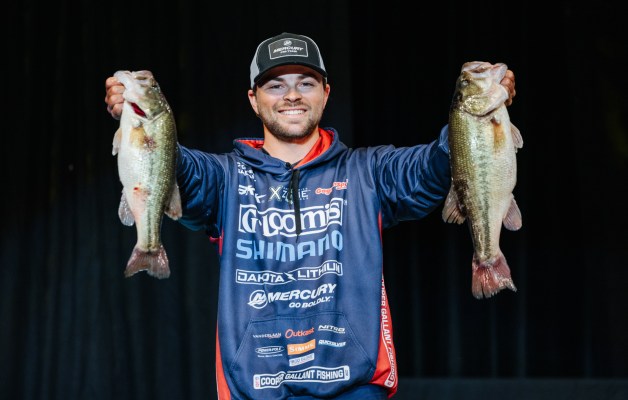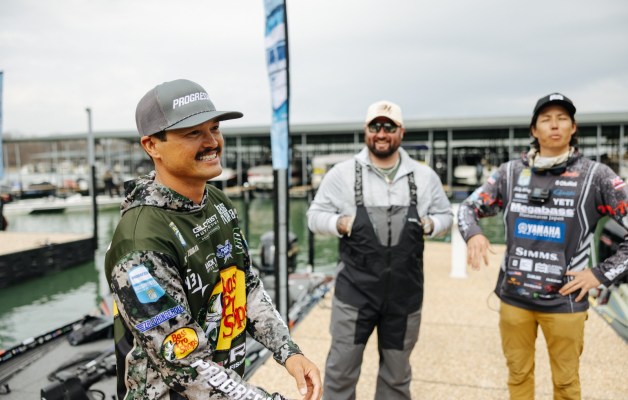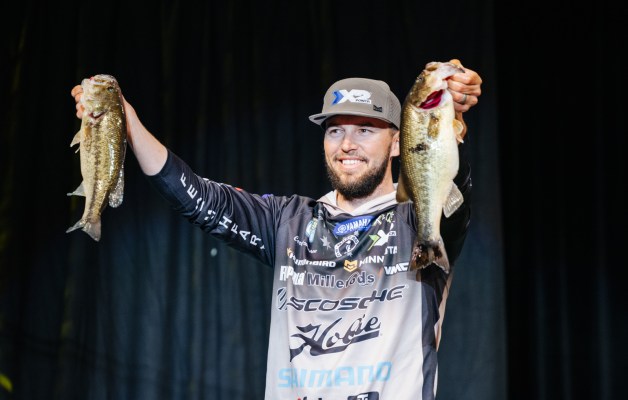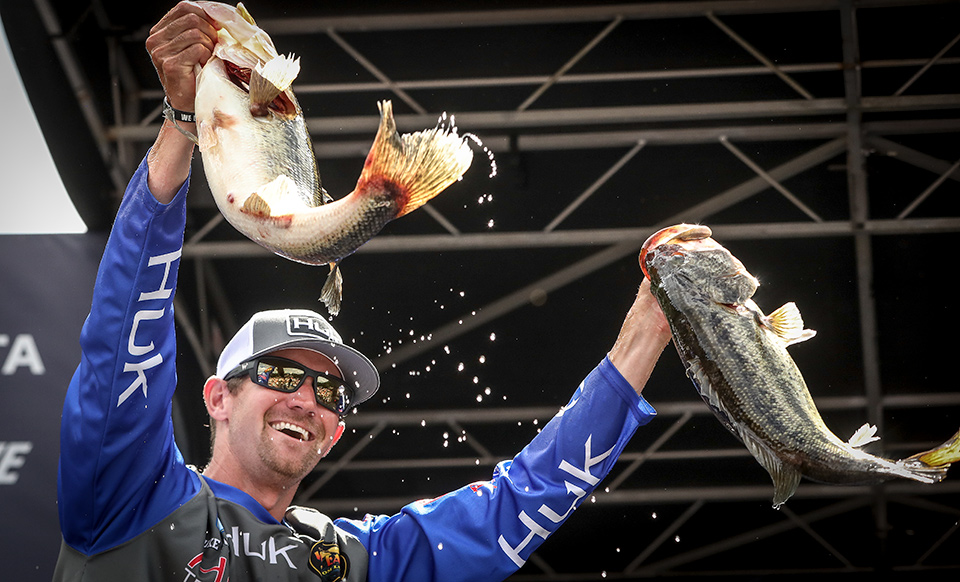
While an Oklahoma native, Luke Palmer has only fished tournaments on Grand Lake O’ the Cherokees a handful of times, each with little to no practice. Nearly every time, however, the Coalgate native has earned a check, and he has notched a couple of Top 10s.
“I’ve probably fished eight to 12 tournaments there in my life,” said the Elite Series champion. “I’m not super familiar with it, but I’ve gotten a lot of checks up there. I’ve just gone up there and fished; I’ve never really gotten to practice on the lake.”
In an effort to re-familiarize himself with the lake, Palmer joined a crowd of Bassmaster Classic qualifiers at Grand Lake in December to get an idea of what patterns might be most productive before the lake went off limits until the start of official practice in March.
The good and bad
Predicting what will happen so early on is nearly an impossible task — particularly when Oklahoma spring provides unpredictable weather. But generally speaking, Palmer believes the middle of March provides some of the best opportunities.
“There are so many things that could happen at once,” Palmer said. “The guy who is leading it could be scoping brushpiles and then all of a sudden, the Day 2 leader has 25 pounds, and he was up in the dirt throwing a spinnerbait. That is a transitioning time of the year. It is a fun time of year to fish in Oklahoma.”
Anglers who did practice close to the cutoff were greeted with rainy, chilly and windy conditions, giving them a preview of the nastier side of Grand Lake. Water levels were more than a foot low.
“I could see the water line on the trees in some of the bays I went into,” said Elite Series sophomore Will Davis Jr. “When we go back it could be high and muddy like it was when Edwin (Evers) won.”
What the pros learned
Palmer spent five days on the lake refreshing his memory bank as well as visiting areas of the lake he’s never been to. His main objective was to see what different creeks and areas of the lake had structure and cover wise.
“I wanted to see what creeks had certain types of rock formations, sand or laydowns,” he said. “If I get on a certain pattern, I would know which creek has what and have a type of pattern mindset when I get there in March.”
He also learned Grand supports quite a large population of spotted bass, with plenty measuring over 2 pounds. A couple even reached the 3-pound mark.
“It was really shocking,” he said. “Normally if you are catching spots in Oklahoma you are screwed. But if you have four spots and a 5-pounder, you can have 15 to 16 pounds.”
Coming off his second straight TNT Fireworks B.A.S.S. Nation Championship victory, Davis made his first-ever trip to Grand to prepare himself for the Classic. He compared it to Logan Martin Lake in his home state of Alabama.
“That place is going to set up really well for a pattern fisherman if you can figure out the deal. There are a lot of different deals you can run,” said the 2023 Lay Lake Elite winner. “I really enjoyed the scenery. I think it will fit well to my style if I can figure out what transition they are on.”
Although he has been to Grand Lake several times, Scott Canterbury had only been there when it was muddy and flooded. During his prepractice, Canterbury found the lake lower than normal and clearer than he’s ever seen it.
“It’s been like eight or 10 years since I’ve been to Grand,” said Canterbury. “I fished for like 20 minutes the whole time I was there. Last time I was there, it was flooded and in the bushes. It was different. I wanted to experience it when it was low, and it was good to see it. I really think it did me a lot of good.”
Overall, the three anglers believe the bass will very likely be in the prespawn phase, unless a major cold snap embraces the region for an extended amount of time. It will be a time of the year where the whole lake could play. Based on his research and practice time, Davis thinks the bass could be staging anywhere from 2 to 20 feet of water, and the big bag of the tournament could be 25 pounds or more.
“After I caught a 6-pounder, I sort of realized this place has got big ones,” Davis said. “I’m going to say someone will bust the 27-pound range, maybe even higher.”
Finding the fish
Forward-facing sonar will likely play a role in the Classic, unless the lake dirties up from a major rain Palmer said. With that said, he also believes there will be plenty of other ways to catch bass.
Canterbury spent a lot of his time looking around at shallow areas and found areas that will have important pieces of cover the bass can hold on if the water rises come tournament time.
“If we get a little warming trend, I know on Grand they like to be shallow. That could be a deal that will really play and someone will always catch them shallow,” he said. “Even in the other Classics, (Jason) Christie was catching them in a foot of water. If it came up a foot and covered up a lot of the shallow cover, I know where a lot of it is.”
Likely patterns
Many of the traditional Oklahoma baits will likely play, from a crankbait to a jerkbait. Palmer believes the winner will be throwing something like a Smithwick Rogue or a Norman Speed N. A spinnerbait and a jig will also play a factor, Canterbury and Davis added.
“Even a ChatterBait will be a player,” Canterbury said. “That lake is one where you have to go after the right ones, and I’m hoping you can do it power fishing shallow.”
Palmer doesn’t necessarily believe there is a sleeper pattern in Oklahoma because of how much the bass change from day to day. However, he and Carl Jocumsen do think big baits like paddletail swimbaits and glide baits could play if conditions are right. For Canterbury, he would love to see an early season buzzbait bite unfold, but that would require the correct conditions.
“My favorite buzzbait bite ever is a prespawn buzzbait bite. But the window is so small that it is rarely open,” said Canterbury.
In the past, and he assumes it will be the same way this time, Canterbury stressed that it’s all about getting quality bites on Grand Lake and less about quantity.
“The times I have been there, you don’t get a ton of bites, but you can get some good quality bites,” Canterbury said. “That’s the type of lake it is. If you can catch six to eight bass a day and have the mindset that you might only get that many bites, you can do really well. It’s going to be awesome to tell you the truth.”

